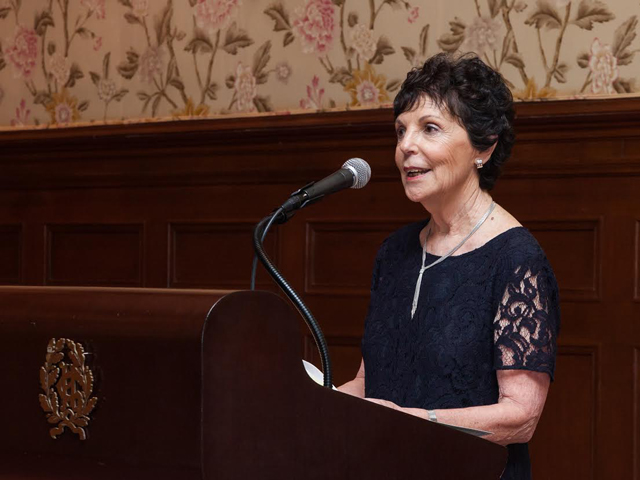
Marcella Rosen speaking at the Untold News Awards ceremony at the Harmonie Club in New York City on November 12, 2014. (Photo/ Jacqueline Iannacone)
When Marcella Rosen is passionate about any issue, she makes sure it is known – not in a pushy or obstinate manner, but in a “Can you believe it?” way.
After the native New Yorker graduated from Barnard College, she earned a masters in clinical psychology from Columbia University while working at night. It was then she realized she wanted to pursue business. The daughter of an orthodox rabbi, and professor, ended up having a 35-year award-winning career in advertising.
“I called up the heads of research at three advertising firms,” says Rosen about how she landed her first job in advertising. “I got three interviews, and I ended up getting the most interesting job…Advertising was a crazy world, but it was a very exciting time. I loved going to work.”
While at N.W. Ayer, she worked on famous accounts like AT&T’s “Reach Out and Touch Someone” ad in the late 1980’s. However, the campaign closest to her heart throughout her long career, she says, was the one that got 13 percent more women to vote in 1992. Rosen says the historic ad was a photo of a woman without a mouth, with the caption, “Most politicians still feel women should be seen and not heard.”
Now retired from advertising, Rosen continues to pursue another cause full-time which she has been working on for more than a decade – raising awareness of the innovative work occurring in Israel. In 2010, she founded the non-profit/news website Untold News (which has a large following on Facebook), and two years later, she wrote the best-selling book, “Tiny Dynamo,” which talks about 21 of the many life-altering technological contributions Israel is making from airport security procedures that use psychology to making ocean water drinkable.
“There’s a pill which has a tiny camera inside it – you swallow it, and it takes pictures of your intestines and beams them back to your doctor’s computer,” says Rosen, excitedly. “One of my other favorites, which is more personal, is freezing breast tumors…You don’t need surgery. You do it in a doctor’s office and go back to work. [These innovations] help all of us.”
She says the country has a “can do” culture, despite its political strife.
“You think how much better life would be if all these wars stopped,” says Rosen. “Last summer, I was there, and at the same time we were having dinner, there were bomb sirens. You have to get up, and then after 10 minutes you go back and finish your dinner.”
However despite it all, she continues, “Israel has helped 52 countries in need from Haiti to sending doctors to the U.S. after Hurricane Sandy…and has made a disproportionate amount of inventions for being the size of New Jersey. It shows what human beings can do when they have to.”
As far as what piece of life advice she would give her younger self now?
“It’s always important to try. I’d rather not succeed than to not have tried,” says Rosen, who is also a pilot on her free time. “We can’t change the world, but in our own spheres we can make a difference. I care about women, and I care about unfairness…and I want to spread that as much as I can.”
